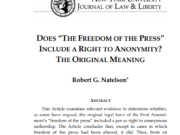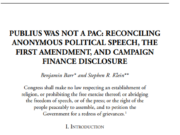Abstract: This essay makes two claims: transparency in government causes the very corruption it aims to prevent, and the problem is universal. Some scholars, mostly philosophers and social scientists, appreciate the first point, but it has not caught on in law. Legal debates — on campaign finance, for example — proceed almost universally on the assumption that transparency deters corruption. Few people, if any, seem to appreciate the second point. Scholars see the corruptive potential of transparency in specific settings, like open ballots. In fact, the problem is general, extending from campaign finance to FOIA and beyond. Efforts to dampen corruption with transparency usually threaten to promote it. The source of the problem is easy to explain. Corruption requires bargaining. By sharing information, transparency lowers the transaction costs of corrupt bargaining.














